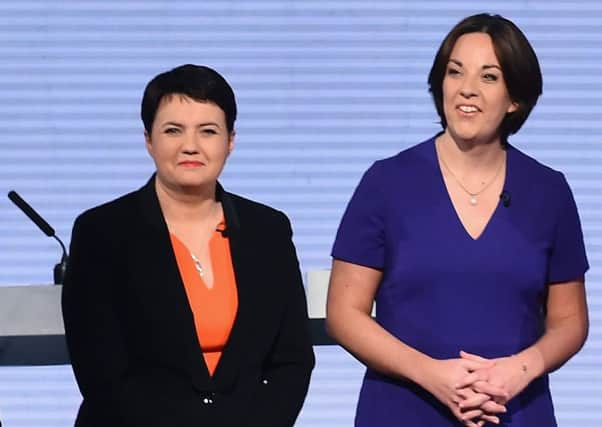Tom Peterkin: End of year report has highs and lows for Davidson and Dugdale


The Scottish Parliament breaks up today, with the last First Minister’s Questions of 2016 drawing the curtain on a quite remarkable political year.
It will be remembered for the political earthquakes of Brexit and Donald Trump. But at a purely Scottish level it has also thrown up a few surprises.
Advertisement
Hide AdAdvertisement
Hide AdThe Holyrood elections in May proved to be an intriguing contest.
Expectations of SNP success were so high that the fact that Nicola Sturgeon failed to return an outright majority was seen as an upset.
The electorate also rearranged the opposition benches to deliver yet another outcome that few would have predicted when the Scottish Parliament came into being in the late 1990s.
Labour, for so long seen as the natural party of government, were overtaken by the Scottish Conservatives who, under Ruth Davidson, became the Official Opposition.
Taking that stark fact in isolation, it might be tempting to regard 2016 as an unmitigated triumph for Davidson and an unmitigated disaster for Scottish Labour’s Kezia Dugdale.
That, however, would be a massive over-simplification when writing the end-of-term reports for the two young women to whom the bulk of the job of holding Nicola Sturgeon to account has fallen.
As they line up to take on Sturgeon at the despatch box for the last time in 2016, it is fair to say Davidson’s upwards path has not always run smoothly while – despite misery at the polls – Dugdale’s leadership shows strong signs of promise.
Any end-of-term report on Davidson has to recognise the huge strides she has made. Since its inception no Conservative had won the annual Scottish Politician of the Year Award until Davidson broke that particular duck this year. The toppling of multiple winner Nicola Sturgeon may have infuriated her acolytes in the SNP, but it was an award won on merit.
Advertisement
Hide AdAdvertisement
Hide AdUnder Davidson’s leadership, the Tories doubled their representation at Holyrood to 31 MSPs. It was a result that would do much to detoxify the brand and lay the ghost of Margaret Thatcher that has haunted the Scottish party for decades.
In the binary world of modern Scotland – where voters now make choices based on their attitude towards Scottish independence – No voters flocked to the Conservatives. Davidson shrewdly and successfully exploited Labour’s demise and the ambiguous messages it was sending out on the constitution.
Davidson herself was impressive in the lead up to the election, which also saw her campaign relentlessly and successfully against the Scottish Government’s controversial plans to give youngsters a “named person”.
Davidson’s willingness to “pull a shift” saw her campaign vociferously for a Remain vote during the EU referendum – notably during a keynote televised debate which was enlivened by her “blue on blue” attacks on Boris Johnson.
But just as Davidson has benefited from being on the winning side of the Scottish referendum, her part in the losing campaign on the EU has resulted in subsequent difficulties.
After the referendum, as a prominent Remainer, Davidson was swift to say that she wanted the UK to stay in the single market – a position that put her at odds with the hard Brexiteers in her own party.
Later in the year the Scottish Conservatives published their five-point Brexit plan, which did not make an explicit commitment to the single market and thus made Davidson vulnerable to attacks from the SNP. The incongruity of Davidson having to defend a party that is leading the charge out of the EU has also made her life difficult at recent First Minister’s Questions. Any attempt by Davidson to skewer Sturgeon on SNP Brexit plans have rebounded.
Many of Kezia Dugdale’s difficulties have stemmed from Labour’s inability to look convincing on the constitution. She did not help herself during the EU referendum campaign with an ill-judged utterance. In an interview, the Scottish Labour leader said it was “not inconceivable” that she could support Scottish independence if there was a vote to leave the EU.
Advertisement
Hide AdAdvertisement
Hide AdHer remarks reflected the challenge her party faced with traditional supporters leaking to the SNP, but they made her look crippled with indecision on the issue dominating Scotland. The reality is that the constitution is the last thing that Labour wants to discuss, with its politicians believing that the way to tackle the SNP is to punch holes in Sturgeon’s domestic record.
However, the independence question is the one that won’t go away. Therefore Dugdale’s anti independence and anti second referendum rhetoric has been stepped up in recent months. In addition, the party has published its ambitious constitutional plans for a federal UK underpinned by a constitutional convention.
It is questionable whether setting up a convention to discuss a complex constitutional solution that requires agreement from throughout the UK is the best way for Scottish Labour to deal with this knotty problem. But at least it is an attempt which Dugdale hopes will free her up to move on to other matters, because she has proved to be at her most effective when holding the Scottish Government to account.
At First Minister’s Questions, she has highlighted inequities and intolerable waits in the NHS. And under her leadership Labour has proved particularly adept at putting transport minister Humza Yousaf under pressure over the crisis that recently engulfed the railway system.